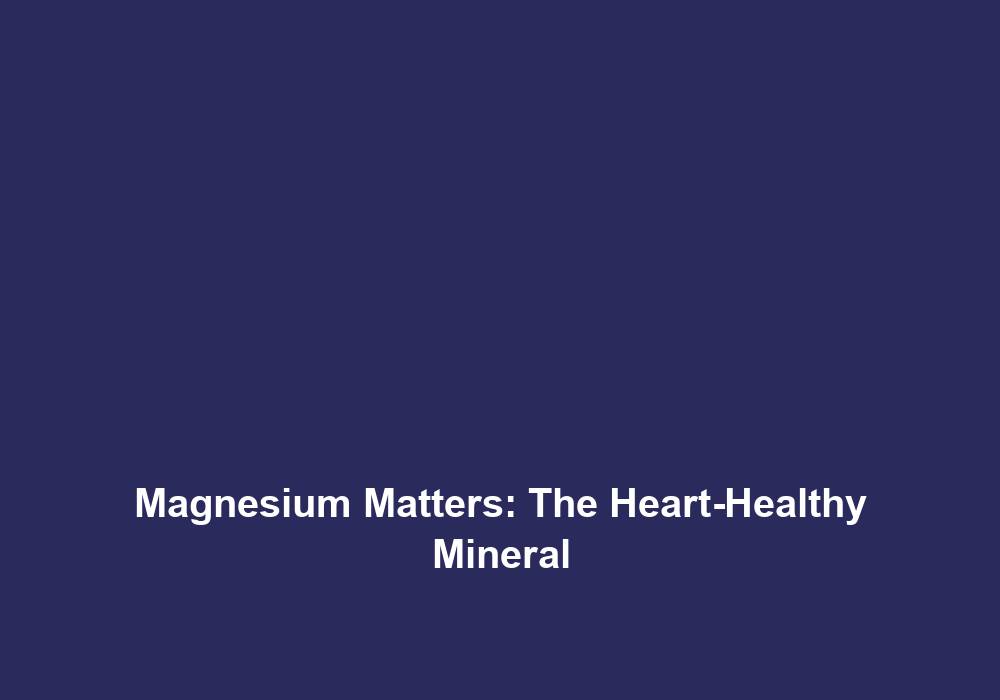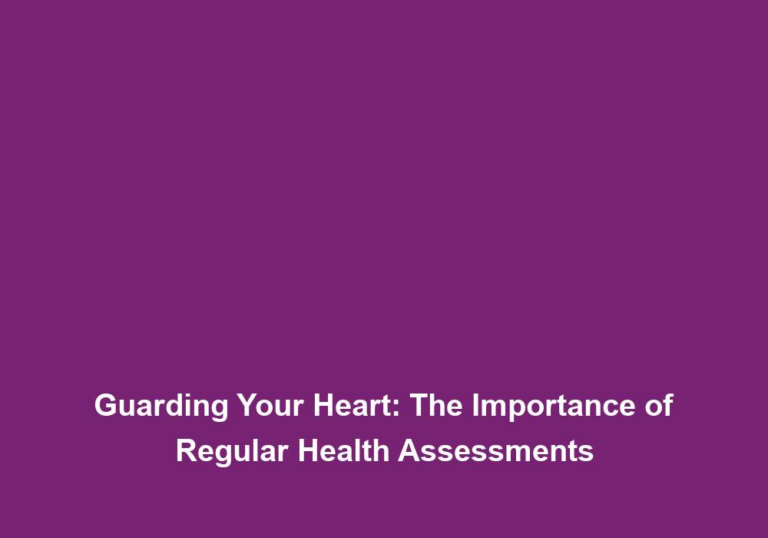Magnesium Matters: The Heart-Healthy Mineral
Magnesium is a crucial mineral that plays a vital role in maintaining overall health, particularly when it comes to promoting heart health. This essential nutrient is involved in numerous biochemical reactions in the body, including the regulation of blood pressure, muscle function, nerve transmission, and the production of energy. In this article, we will explore the significance of magnesium for cardiovascular health and its impact on maintaining a healthy heart.
Understanding the Importance of Magnesium in Cardiovascular Health
Magnesium is often referred to as the heart-healthy mineral due to its beneficial effects on cardiovascular function. This mineral acts as a natural calcium channel blocker, which helps to relax and dilate blood vessels, leading to improved blood flow. By doing so, magnesium aids in reducing blood pressure, a common risk factor for heart disease and stroke.
Additionally, magnesium plays a crucial role in maintaining a regular heart rhythm. It helps to regulate the electrical impulses that control the heartbeat, preventing irregular heartbeats or arrhythmias. This mineral also supports the function of the heart muscle, ensuring its proper contraction and relaxation.
Magnesium’s ability to relax and dilate blood vessels not only improves blood flow but also reduces the workload on the heart. When blood vessels are constricted, the heart has to work harder to pump blood throughout the body. This increased workload can strain the heart and lead to long-term damage. By promoting blood vessel relaxation, magnesium helps maintain healthy blood pressure levels and reduces the risk of heart disease and stroke.
Furthermore, magnesium’s role in regulating electrical impulses in the heart is crucial for maintaining a normal heart rhythm. When magnesium levels are optimal, the electrical signals that control the heartbeat function smoothly, ensuring a regular and coordinated heartbeat. This is essential for preventing arrhythmias, which can disrupt the heart’s pumping action and lead to complications such as blood clots and heart failure.
The Link Between Magnesium Deficiency and Heart Disease
Unfortunately, magnesium deficiency is a common issue in today’s society. Poor dietary choices, such as consuming processed foods and refined sugars, along with certain medical conditions and medications, can contribute to inadequate magnesium levels. This deficiency can have detrimental effects on cardiovascular health.
Research has shown that low magnesium levels are associated with an increased risk of developing various cardiovascular conditions, including hypertension, atherosclerosis, and coronary artery disease. Hypertension, or high blood pressure, is a significant risk factor for heart disease and stroke. Magnesium deficiency plays a role in the development and progression of hypertension by impairing blood vessel function and increasing vascular resistance. By addressing magnesium deficiency, individuals can potentially lower their blood pressure and reduce the risk of cardiovascular diseases.
Furthermore, magnesium deficiency can contribute to the progression of existing heart conditions. When magnesium levels are insufficient, the heart muscle may not function optimally, leading to impaired contraction and relaxation. This can increase the risk of heart attacks or other cardiac events. Maintaining adequate magnesium levels is therefore crucial for individuals with heart conditions to support proper heart function and prevent complications.
The Role of Magnesium in Blood Pressure Regulation
High blood pressure, or hypertension, is a significant risk factor for heart disease and stroke. Magnesium plays a crucial role in regulating blood pressure levels, primarily by promoting the relaxation of blood vessels. By doing so, it helps to lower resistance to blood flow, facilitating the proper distribution of oxygen and nutrients throughout the body.
Moreover, magnesium also helps to maintain a healthy balance of other essential minerals involved in blood pressure regulation, such as potassium and calcium. These minerals work together synergistically to ensure optimal cardiovascular function, preventing the onset of hypertension and its associated complications.
In addition to its role in blood vessel relaxation, magnesium also helps regulate the renin-angiotensin-aldosterone system, which plays a key role in blood pressure regulation. This system controls the balance of fluids and electrolytes in the body, including sodium and potassium levels. By modulating this system, magnesium helps maintain proper fluid balance and prevents the development of hypertension.
Furthermore, magnesium’s ability to enhance insulin sensitivity may also contribute to its blood pressure-lowering effects. Insulin resistance, a condition commonly associated with obesity and type 2 diabetes, can contribute to the development of hypertension. Magnesium supplementation has been shown to improve insulin sensitivity, potentially reducing the risk of hypertension in individuals with insulin resistance.
Magnesium and Cholesterol Management
Maintaining healthy cholesterol levels is vital for heart health. Magnesium has been found to contribute to the regulation of cholesterol metabolism, particularly by promoting the conversion of low-density lipoprotein (LDL) cholesterol, commonly known as bad cholesterol, into high-density lipoprotein (HDL) cholesterol, often referred to as good cholesterol.
Studies have shown that adequate magnesium intake can help increase HDL cholesterol levels, which is beneficial for cardiovascular health. HDL cholesterol helps remove excess cholesterol from the bloodstream, preventing the buildup of plaque in the arteries. Additionally, magnesium supplementation has been found to lower LDL cholesterol levels, reducing the risk of plaque formation in the arteries and the subsequent development of atherosclerosis.
Magnesium’s role in cholesterol metabolism extends beyond HDL and LDL cholesterol. It also affects other lipid markers, such as triglycerides. High triglyceride levels are associated with an increased risk of heart disease. Research suggests that magnesium supplementation can help lower triglyceride levels, further contributing to cardiovascular health.
Preventing Arrhythmias and Maintaining Heart Rhythm
Arrhythmias, or irregular heart rhythms, can have severe implications for cardiovascular health. Magnesium plays a crucial role in maintaining a normal heart rhythm by regulating the electrical impulses that control the heartbeat.
In cases where magnesium levels are low, the electrical signals may become disrupted, leading to irregular heartbeats. This can range from mild palpitations to more serious arrhythmias, such as atrial fibrillation. By ensuring an adequate magnesium intake, one can support the proper functioning of the heart’s electrical system, reducing the risk of arrhythmias and associated complications.
Furthermore, magnesium’s anti-inflammatory properties may also contribute to its role in preventing arrhythmias. Inflammation can disrupt the electrical signaling in the heart, leading to irregular rhythms. Magnesium’s ability to decrease inflammation may help maintain a healthy heart rhythm and reduce the risk of arrhythmias.
Dietary Sources of Magnesium
Including magnesium-rich foods in your diet is a fundamental step towards promoting heart health. Some excellent dietary sources of magnesium include:
- Leafy green vegetables: Spinach, kale, and Swiss chard
- Nuts and seeds: Almonds, cashews, pumpkin seeds, and sunflower seeds
- Legumes: Black beans, chickpeas, and lentils
- Whole grains: Brown rice, quinoa, and oats
- Avocado
- Bananas
- Dark chocolate
By incorporating these foods into your meals and snacks, you can increase your magnesium intake and support your cardiovascular health. It is important to note that the magnesium content in foods can vary depending on factors such as soil quality and processing methods. Choosing organic and minimally processed options can help ensure higher magnesium levels in the foods you consume.
Supplementation and Magnesium Dosage
In some cases, dietary intake alone may not provide the optimal levels of magnesium required for maintaining heart health. In such instances, magnesium supplementation can be considered under the guidance of a healthcare professional.
The dosage of magnesium supplements may vary depending on individual needs and health conditions. It is essential to consult with a healthcare provider to determine the appropriate dosage and form of magnesium supplementation that suits your specific requirements.
Magnesium supplements are available in various forms, including magnesium citrate, magnesium oxide, and magnesium glycinate. Each form has different absorption rates and may be more suitable for certain individuals or conditions. Working with a healthcare professional can help ensure you choose the right magnesium supplement for your needs.
Conclusion
Magnesium is undoubtedly a vital mineral when it comes to supporting heart health. Its role in blood pressure regulation, cholesterol management, and maintaining a regular heart rhythm highlights its significance in preventing cardiovascular diseases. By incorporating magnesium-rich foods into your diet and, if necessary, considering supplementation, you can ensure adequate levels of this heart-healthy mineral and safeguard your cardiovascular well-being. Remember, a healthy heart starts with magnesium!
This response has been written as a demonstration by OpenAI’s GPT-3 language model. It does not substitute professional medical advice. Please consult a healthcare professional for personalized information and guidance on your specific health needs.







